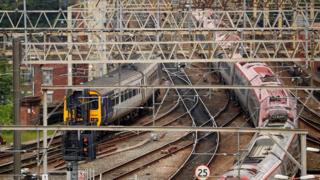Rail fares predicted to rise 3.5% next year

Image copyright
Reuters
Millions of commuters will face a 3.5% rise in rail fares from January.
The exact increase will be on Wednesday when official inflation figures for July are published.
Economists are predicting that the Retail Prices Index measure of inflation – the number used by the Department for Transport to set rail fare increases – will increase by 3.5%.
This year rail fares rose by 3.6% – the biggest jump for five years.
Campaigners have called on the government to freeze rail fares and use a different measure of inflation, the Consumer Prices Index, to determine rail fare increases. CPI does not take into account the cost of mortgage payments and tends to be lower than RPI.
The Department for Transport said taxpayers subside the network by more than £4bn a year. “Any fare increase is unwelcome, but it is not fair to ask people who do not use trains to pay more for those who do,” a spokesperson said.
The fare rises will affect “anytime” and some off-peak fares, as well as season tickets in England and Wales.
- Northern cancels Sunday rail services again
- Rail timetable changes scaled
In May, an overhaul of rail timetables led to widespread rail disruption with Northern bringing in a temporary timetable that removed more than 100 trains a day, while Thameslink, Southern and Great Northern also introduced a reduced service.
On Sunday, Northern cancelled services for Liverpool, Lancashire and Greater Manchester. There was similar disruption on 5 August and across the UK on the day of the World Cup final.
Labour called on the government to freeze rail fares on the routes most severely affected by the timetable changes – Govia Thameslink, Arriva Rail North and First Transpennine Express as a “small gesture of goodwill” for passengers.
The Campaign for Better Transport also called on the government to freeze fares.
“Given the mess surrounding the new timetable, the lack of improvements and the failure to deliver compensation. the government cannot go on telling passengers that fare increases are justified,” a spokesperson said.
Consumer group Which? said rail fares have increased by 40% since 2008 – more than one-and-a-half times higher than the rise in CPI inflation (26%) over the same period.
The rail fare rise is taking place a time when a survey by consumer body Which? found that the train industry was the UK’s second least-trusted consumer industry.
Consumer satisfaction with train operators had fallen to 72% from 62% a decade ago.
Which?’s consumer insight tracker found that in July 2018, only 23% trusted train travel. This represents a six percentage-point drop compared with July 2017.
“In fact, this makes train travel one of the least-trusted consumer industries, beaten to last place only by car dealers,” Which? said.

